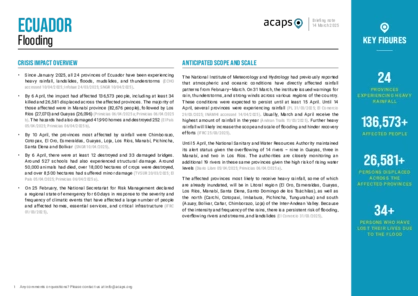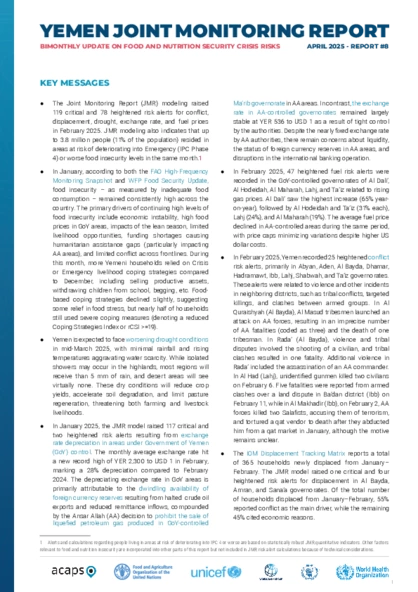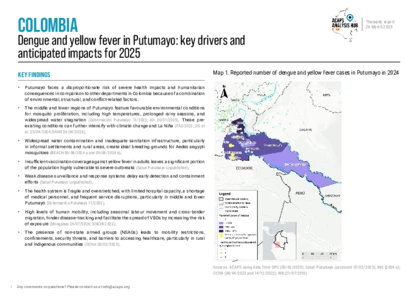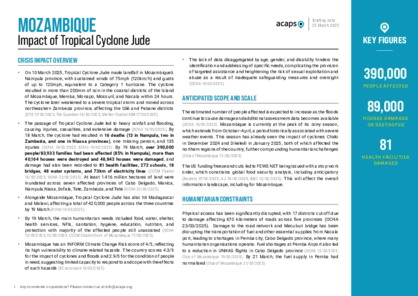Explore our
analysis products
archive
10 April 2025
Myanmar earthquake: Shan pre-crisis profile
DOCUMENT / PDF / 392 KB
On 28 March 2025, a magnitude-7.7 earthquake struck Myanmar’s Sagaing region. In southern Shan state, the most severe shaking affected Hopong, Hsi Hseng, Kalaw, Langkho, Lawksawk, Nyaungshwe, Pinlaung, and Taunggyi townships. Prior to the earthquake, these townships were already dealing with significant humanitarian needs.
10 April 2025
Sudan: Humanitarian access developments (October 2024 to March 2025)
DOCUMENT / PDF / 19 MB
This report highlights the key developments affecting humanitarian access in Sudan between October 2024 and March 2025 at both the national and subnational levels, accounting for significant regional variations in access constraints. This is a follow-up report to the 27 June 2024 ACAPS report on humanitarian access in Sudan.
02 April 2025
Bimonthly update on food and nutrition security crisis risks- Issue 8
DOCUMENT / PDF / 2 MB
The JMR combines quantitative modeling and qualitative analysis to provide robust bimonthly food and nutrition security monitoring that identifies emerging food and nutrition security crisis risks.
01 April 2025
Myanmar earthquake: Sagaing pre-crisis profile
DOCUMENT / PDF / 721 KB
On 28 March 2025, a 7.7-magnitude earthquake struck Sagaing region, Myanmar. Only 12 minutes after the earthquake hit, a powerful 6.4-magnitude aftershock was registered, worsening the destruction and causing additional damage in Mandalay and Sagaing regions, hindering rescue operations and increasing casualties.
01 April 2025
Afghanistan: Implications of the US foreign aid cuts on the humanitarian response
DOCUMENT / PDF / 1 MB
This report builds on ACAPS’ briefing note on what the US aid freeze means to Afghanistan, published on 7 February 2025. It aims to provide a more comprehensive overview of the implications of the US aid freeze and subsequent cuts on humanitarian programming in the country, with a focus on how this affects humanitarian response capacity and Afghans.
31 March 2025
Ukraine: implications of the US foreign aid cuts
DOCUMENT / PDF / 766 KB
This report provides an overview of the implications of the US foreign aid freeze and cuts on humanitarian, development, and government programmes, with a focus on the impacts on humanitarian response capacity and affected communities. It aims to support donor contingency planning and the advocacy efforts of affected organisations.
Attached resources
31 March 2025
Ukraine: scenarios in 2025
DOCUMENT / PDF / 1 MB
This report considers three distinct yet plausible futures for Ukraine through the end of 2025. They focus on how changes in the situation in the country will affect people’s ability to meet their basic needs and affect humanitarian operations in and around Ukraine.
29 March 2025
Myanmar earthquake: Mandalay pre-crisis profile
DOCUMENT / PDF / 314 KB
On 28 March 2025, a 7.7-magnitude earthquake struck Myanmar’s Sagaing region, followed by a 6.4-magnitude aftershock in Mandalay region. By 29 March, around 1,650 people were reported killed and 3,410 injured. These figures are expected to rise in the coming days.
26 March 2025
Colombia: Dengue and yellow fever in Putumayo - key drivers and anticipated impacts for 2025
DOCUMENT / PDF / 2 MB
This report analyses the anticipated humanitarian impacts of a potential increase in dengue and yellow fever cases in Putumayo during 2025. It analyses how key drivers, structural vulnerabilities, and aggravating factors could shape the spread of these vector-borne diseases (VBDs) and their humanitarian impacts in this scenario.
Attached resources
25 March 2025
Palestine: end of ceasefire and blockade in Gaza
DOCUMENT / PDF / 363 KB
On the evening of 17 March 2025, Israel unilaterally ended the ceasefire that it agreed upon with Hamas on 15 January, launching air strikes on Gaza. During the ceasefire, Israel had killed at least 170 Gazans and allowed only 70% of the 600 aid trucks to be allowed in daily. The 17 March air strikes killed at least 404 civilians and injured around 660.
25 March 2025
Mozambique: impact of tropical cyclone Jude
DOCUMENT / PDF / 263 KB
The passage of Tropical Cyclone Jude led to heavy rainfall and flooding, causing injuries, casualties, and extensive damage. By 18 March, the cyclone had resulted in 16 deaths, one missing person, and 135 injuries. By 19 March, over 390,000 people had been affected (85% in Nampula), and more than 89,000 houses were destroyed or damaged.
24 March 2025
Myanmar: implications of the US funding freeze and cuts in the response and health needs
DOCUMENT / PDF / 285 KB
This report analyses the actual (by March 2025) and potential implications of the US funding freeze and cuts on the overall humanitarian response in Myanmar, with a particular focus on national and local organisations. It includes a spotlight on the health sector, which is facing significant cuts amid rising health needs.
20 March 2025
Ukraine: humanitarian implications of the war in Ukrainian-controlled territory in Khersonska oblast
DOCUMENT / PDF / 2 MB
The report aims to present the war-related developments and resulting humanitarian impacts in the Ukrainian-controlled territory of Khersonska oblast (namely Beryslavskyi raion and six hromadas of Khersonskyi raion since July 2024.
Attached resources
19 March 2025
Somalia: Impact of clan conflicts
DOCUMENT / PDF / 1 MB
This report aims to provide a detailed analysis of the causes, dynamics, and humanitarian impacts of clan-based conflicts in Somalia, with a focus on the recently most affected areas. It explores the historical, sociopolitical, and economic roots of the phenomenon, seeking to inform humanitarian responders, policy makers, and development practitioners.
14 March 2025
Afghanistan: Uzbekistan’s bilateral aid and economic investments
DOCUMENT / PDF / 319 KB
This paper examines Uzbekistan's engagement in Afghanistan, focusing on the period since August 2021. It first describes Uzbekistan's foreign policy perspective on Afghanistan, including humanitarian assistance and economic investments and cooperation.
13 March 2025
Ethiopia: implications of the US aid freeze & terminations
DOCUMENT / PDF / 1 MB
This report aims to provide a national-level analysis of the implications of the US funding freeze and subsequent terminations of aid for the humanitarian context in Ethiopia to support understanding and decision-making.
13 March 2025
DRC: Anticipated implications of US stop-work orders and subsequent cuts
DOCUMENT / PDF / 1,014 KB
This report analyses the current and potential implications of the US SWOs, subsequent cuts on humanitarian operations, and needs in the DRC, with a focus on the escalating humanitarian needs in eastern DRC provinces as conflict persists.
05 March 2025
Lebanon: After the ceasefire: current situation, humanitarian needs, and outlook
DOCUMENT / PDF / 734 KB
This report provides an overview of the humanitarian situation in Lebanon following the ceasefire between Israel and Hezbollah. The report examines the impact of the conflict on key civilian infrastructure and sheds light on the continuing needs of the affected population.





















